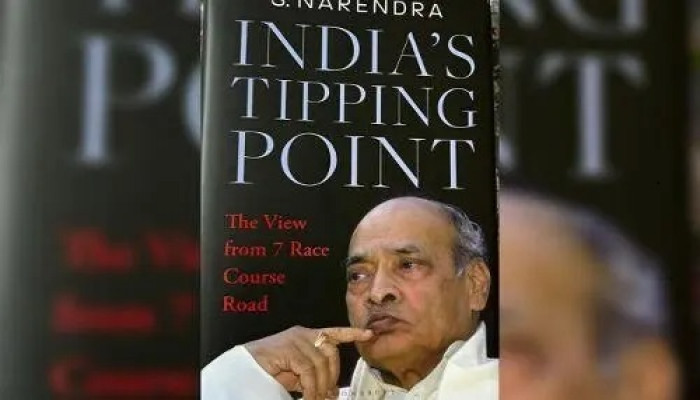India’s Tipping Point: The View From 7 Racecourse Road
- In Book Reviews
- 10:59 AM, May 15, 2023
- Venkataraman Ganesan
On the 24th of July 1991, India’s Industry Minister with a dour and stern demeanour made a matter of fact announcement. Although bereft of any kind of fanfare or hype, this move has significant and enduring ramifications for the Indian economy. The Industries Development and Regulation Act, 1951 (IDRA for short), the very bastion of the pernicious License Raj regime was going to be dismantled in one fell swoop. Consequent to such a rescindment, all industries barring a few ‘strategic’ ones, would be free from the shackles of licensing.
The audacious Industries Minister who took this unimaginable leap of faith also happened to be his nation’s Prime Minister. A prescient mind, a polyglot and the very epitome of patience, P.V. Narasimha Rao was paving a trajectory for the largest democracy on the Planet, the likes of which was never seen before and would be emulated in perpetuity since.
S. Narendra, a career civil servant and Prime Minister Narasimha Rao’s information advisor during some of India’s economically tumultuous years, provides an insider perspective on some of the bravest reforms undertaken in the political history of the country. In a glittering career with the Indian Information Service that extended beyond forty years, Narendra discharged his responsibilities from many key positions. Initially donning the mantle of Director General of the Directorate of Advertising, Narendra was appointed Principal Information Officer, and concurrently information adviser to the prime minister before finally ending his tenure in Government as a spokesperson of the Government of India (1992–1998).
India’s Tipping Point: The View From 7 Race Course Road, details in a very crisp but telling manner the actions taken by one determined individual that paved the way for a nation that was forced to pledge its gold reserves with the International Monetary Fund (IMF) to tide over an embarrassing Balance of Payment crisis, to the fifth largest economy in the Planet with burgeoning foreign exchange reserves.
These reforms were undertaken in the backdrop of certain extenuating circumstances. In addition to the economic blunders that took the form of Nehruvian Socialism with an uncompromising attraction towards a command and control economy, the early 1990s also saw some undesirable developments on the internal security front. An unrelenting fusillade of terrorist activities was racking Jammu & Kashmir. Members of the Khalistan movement began to link up with separatists in Jammu and Kashmir. The Liberation Tigers of Tamil Eelam (LTTE) in Sri Lanka were busy cultivating their own network with Indian separatist movements. Pakistan was deftly using the land mass of Nepal and Myanmar to train and equip elements antithetical to India before smuggling them in via Jammu and Kashmir.
To add to an already overflowing cup of woes, Rao was walking a tightrope in trying to balance the future prospects of a nation and the demands of his own party men. Wedded to the political and economic philosophies espoused by the Nehru-Gandhi dynasty, many party workers expressed their reservations, both overtly and covertly against many of the reforms proposed by Rao and helmed by his adroit Finance Minister Manmohan Singh. These reforms were seen by the acolytes of the late Prime Ministers, Jawaharlal Nehru and Indira Gandhi as being inimical to the construct of socialism and hence deserving of the most stringent form of opposition. The political acumen of Rao came to the fore here in overseeing his intransigent Congressmen. In an All India Congress Committee session that was held at Tirupati, Rao in a carefully worded talk gave the impression of rigorously toeing the Nehruvian tenets but adding a novel step or two to the existing mix.
The entrenched and dogmatic attitude should not have come across as a surprise to the Prime Minister. For context, it would be apposite to recall that Indira Gandhi, in 1969, had slighted her own party president S. Nijalingappa at an All India Congress Committee (AICC) session in Bangalore for suggesting that the government would do well to relax its control over the economy that was in a very perilous shape and parlous situation. Such a ‘temerity’ could not be tolerated at any cost!
Rao however took an undaunted approach when it came to pursuing economic reforms. Immediately following the abolition of the IDRA, he proceeded to establish the Foreign Investment Promotion Board (FIPB) in his office to fast-track foreign direct investment (FDI) proposals. This move was the earliest precursor to the ‘ease of doing business in India’ initiative. In fact, S. K. Birla, the then president of the Federation of Indian Chambers of Commerce and Industry (FICCI), was quoted in the media as saying, ‘The (new) industrial policy is the first major step in what is necessarily a continuous process of deregulating the economy.’
The deregulation and delicensing moves were an absolute necessity and could not have come even a day too soon. Consumer prices had spiraled to 16.7 percent year-on-year ascendancy. By the end of 1991, there was a clear and present danger of India reneging on her external debt repayment obligations. The astute Rao took an emboldening decision to dispatch the Reserve Bank of India (RBI)’s gold reserves to the Bank of England, borrow money and fulfill the debt obligations. The diplomat par excellence had in a trump card informally kept all political leaders in the loop before undertaking this decision.
As Narendra illustrates, a slew of path-breaking reforms were instituted and implemented by Narasimha Rao. However, it is an unpardonable travesty that the man still remains an unsung hero in the annals of Indian politics and polity. Many of the rewards that are being reaped by the Indian populace in terms of a renewed economy and a resurgent entrepreneurial ecosystem have their genesis in the Rao era promulgations.
Rao himself was fond of the term “calibrated reforms.” He was pragmatic enough to understand that the economy or the specific segment against which a reform was proposed to be implemented, ought to have the capacity to absorb such a reform. Craftily linking the security of the nation to the prospering of its economy, Rao under the stewardship of the redoubtable Dr. A.P.J. Abdul Kalam, gave clearance to the Defense Research and Development Organisation (DRDO) to demonstrate its capability of launching the Agni rocket. This was in addition to the indigenization efforts that resulted in the development of formidable missiles such as Prithvi, Nag, Akash and Pinaka.
Rao envisioned the concept of a multi-modal transport system for enhancing the efficiency and efficacy of the logistics segment of the economy. The passage of the Multi-Modal Transport Act in 1993 created a single authority for registering various operators. The eighth five-year plan laid approximately 6,000 kilometers of broad gauge railway track. Efforts were also made to modernize the ailing and archaic power sector by establishing independent power sector regulators at both the Centre and states as the functions of power generation, distribution and transmission were segregated with separate entities running them.
One of the most difficult and controversial reforms was the partial opening up of the media industry to foreigners. The Indian Telegraph Act, 1881 was amended and the Cable TV Regulation Act, 1994 was introduced to permit cable TV beaming private and foreign broadcasting in India.
However, a series of unfortunate extraneous catastrophes and internecine wrangling brought the Narasimha Rao Government to its knees. The Harshad Mehta scam (where it was ludicrously alleged that the fraudster stock broker had given a suitcase full of money amounting to INR 1 crore to Rao at his residence – an allegation that was later dismissed as unfounded), the Jain Diaries or the Hawala scandal, the Telecom Scandal and the Sugar Import scam (which also had the son of Rao as a potential suspect for a brief time) all played their role in causing an already minority Government to teeter at the brink. Opportunistic wolverines such as former Home Minister Arjun Singh, in falling over their heels to appease and procure the loyalties of No.10 Janpath also started openly rebelling against Rao. Acerbic and volatile statements were issued by his own party men alleging all forms of accusations against the vulnerable Prime Minister.
Rao finally was forced to cede his position to a coalition Government headed by Deve Gowda and supported by the Congress from the outside.
While former Finance Minister and later Prime Minister, Manmohan Singh is remembered as the ‘father of economic reforms,’ the wily, witty and wise Narasimha Rao is unjustly, unwarrantedly and unfairly relegated to the periphery. In what can only be termed a dastardly act, the Congress Party did not even permit the funeral of the Prime Minister to be conducted in the national capital. A memorial was erected for this great man, a full ten years after his passing. It is also equally dismal that the Narendra Modi-led BJP Government has also not deemed it fit to honour this unflinching and selfless son of India in a most befitting manner by conferring upon him the highest civilian honour.
It is time, that Pamulaparthi Venkata Narasimha Rao is not just known as either the ninth Prime Minister of India or as PVN, but is fondly remembered for ever as Bharata Ratna P.V. Narasimha Rao. Hope the current administration makes this a reality in the same manner in which the maestro made unthinkable economic reforms not just a reality but an inevitable way of governance!
Published by Bloomsbury Publishing, pp: 257
Disclaimer: The opinions expressed within this article are the personal opinions of the author. MyIndMakers is not responsible for the accuracy, completeness, suitability, or validity of any information on this article. All information is provided on an as-is basis. The information, facts or opinions appearing in the article do not reflect the views of MyindMakers and it does not assume any responsibility or liability for the same.







Comments